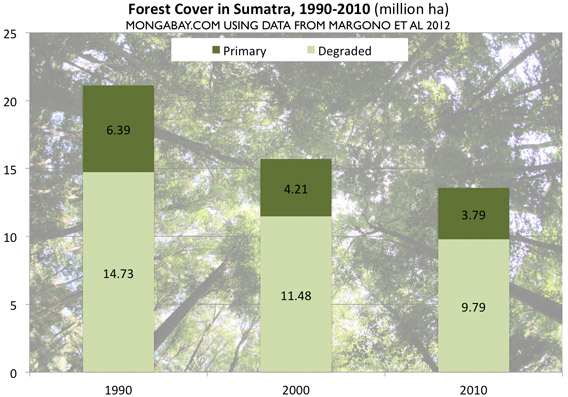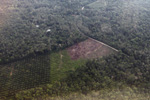
Rainforest in Sumatra
HarperCollins has established a policy that excludes paper sourced from destruction of tropical rainforests and old growth forests.
The revised policy, posted on its web site earlier this month, is a response to a campaign by the Rainforest Action Network (RAN), an activist group that is targeting companies linked to clearing of Indonesian rainforests and peatlands for pulp and paper production: Asia Pulp & Paper (APP) and Asia and Asia Pacific Resources International (APRIL). With the new policy, HarperCollins has become the final of the ten largest publishers in the United States to phase out buying from APP and APRIL, according to RAN.
The new policy refers specifically to avoiding rainforest fiber from Indonesia.
“In the production of all HarperCollins books, we endeavor to eliminate the use of paper from controversial sources that may contain fiber from endangered and old-growth forest areas,” states the publishing giant’s web site. “HarperCollins prohibits sourcing from Indonesian tropical rainforests, old growth and/or endangered forests for our products.”
HarperCollins goes on to state that it “[does] not do business with companies that collude with or purchase wood products from illegal logging operations” and notes that third-party suppliers will be required to “provide proof that third-party sources of wood are harvested in an environmentally sound manner.”
HarperCollins also said has implemented “a program of random fiber testing of books to ensure our product is free of tropical hardwood fiber.”
RAN says the new policy caps a “seismic shift” in the publishing industry.
“All of the top ten US publishers in the country now recognize that customers will not accept books with paper that comes from the destruction of endangered rainforests. This is a seismic shift in an industry that just two years ago was rife with controversial paper,” said Robin Averbeck, a Forest Campaigner with Rainforest Action Network. “US publishers are sending a loud and clear message to forest destroying paper companies like Asia Pulp and Paper and APRIL that consumers are demanding rainforest safe paper.”
Part of HarperCollins’ procurement policy includes sourcing fiber from operations certified under forest products standards including the Forest Stewardship Council (FSC), the Sustainable Forestry Initiative (SFI), and the Programme for the Endorsement of Forest Certification (PEFC), none of which explicitly prohibit logging of rainforests, peat forests, or old growth forests. Whether HarperCollins’ policy includes stipulations that go beyond these certification schemes isn’t immediately clear, but RAN typically pushes companies to adopt stricter safeguards than mandated by certification bodies.

Pulp and paper production is one of the biggest drivers of deforestation and peatlands degradation on the Indonesian island of Sumatra. By one estimate, APP and APRIL together cleared 2 million hectares (5 million acres) of forest in Riau Province alone since the mid-1980s, accounting for half the province’s forest loss during that time. Environmentalists say ongoing clearing by the paper giants puts endangered species like the Sumatran tiger and elephant at greater risk of local extinction.
Up to 1.2 million hectares of standing forest and peatland in Sumatra is still licensed for clearing, according to Eyes on the Forest, a coalition of Indonesian NGOs. Eyes on the Forest estimates that conversion of that area will generate up to 500 million tons of carbon emissions.
Both APP and APRIL maintain that they operate within the laws of Indonesia, but the paper giants have been subject to investigations over alleged illegal logging, including a massive case in Riau province which prosecutors claim caused more than $200 billion to the Indonesian state. Neither company however, has been found guilty of wrong-doing by Indonesian courts.
Related articles
Paper giant breaks pledge to end rainforest logging in Sumatra, says group

(12/26/2012) Pulp and paper giant Asia Pacific Resources International Limited (APRIL) continues to destroy large areas of rainforests and peatlands despite a commitment to end natural forest logging by 2009, says a new report issued by a coalition of Indonesian environmental groups. The Eyes on the Forest report finds that APRIL and its suppliers cleared at least 140,000 hectares (346,000 acres) of natural forest between 2008 and 2011 in Riau, accounting for 27 percent of all forest loss in the province during the period. Some of the area cleared by APRIL and its subsidiaries consisted of deep peat swamp forest, which stores massive amount of carbon.
Indonesia’s Environment Ministry to sue APP, APRIL in $225B illegal logging case
(05/03/2012) Indonesia’s Ministry of Environment is planning to sue 14 pulp and paper companies for illegally logging forests in Riau Province on the island of Sumatra, reports Tempo Magazine. 12 of the 14 companies are linked to Asia Pulp & Paper (APP) and Asian Pacific Resources International Holdings Limited (APRIL), pulp and paper giants that have been heavily criticized by environmentalists for destroying rainforests and peatlands that serve as critical habitat for endangered tigers, elephants, and orangutans.
Indonesia’s anti-mafia unit seeks to reopen $115 billion illegal logging case
(06/08/2011) Indonesia’s Anti-Mafia Law Task Force asked authorities Tuesday to reopen an investigation into illegal logging that may have cost the Indonesian state $115 billion.
Does chopping down rainforests for pulp and paper help alleviate poverty in Indonesia?

(01/13/2011) Over the past several years, Asia Pulp & Paper has engaged in a marketing campaign to represent its operations in Sumatra as socially and environmentally sustainable. APP and its agents maintain that industrial pulp and paper production — as practiced in Sumatra — does not result in deforestation, is carbon neutral, helps protect wildlife, and alleviates poverty. While a series of analyses and reports have shown most of these assertions to be false, the final claim has largely not been contested. But is conversion of lowland rainforests for pulp and paper really in Indonesia’s best economic interest?
Pulp and paper firms urged to save 1.2M ha of forest slated for clearing in Indonesia

(03/17/2011) Indonesian environmental groups launched a urgent plea urging the country’s two largest pulp and paper companies not to clear 800,000 hectares of forest and peatland in their concessions in Sumatra. Eyes on the Forest, a coalition of Indonesian NGOs, released maps showing that Asia Pulp and Paper (APP) and Asia Pacific Resources International Limited (APRIL) control blocks of land representing 31 percent of the remaining forest in the province of Riau, one of Sumatra’s most forested provinces. Much of the forest lies on deep peat, which releases large of amount of carbon when drained and cleared for timber plantations.
Timber certification is not enough to save rainforests

(06/02/2010) In the 1980s and 1990s pressure from activist groups led some of the world’s largest forestry products companies and retailers to join forces with environmentalists to form the Forest Stewardship Council (FSC), a certification standard that aims to reduce the environmental impact of wood and paper production on natural forests. Despite initial skepticism on whether buyers would pay a premium for greener forest products, FSC quickly grew and by 2000 had become a standard in many markets, including Europe and the United States. Companies like Home Depot, Lowe’s, and Ikea are today strong supporters of the FSC. But the FSC has not been without controversy. In recent years some activists have voiced concern about FSC standards as well as the credibility of auditors that certify timber operations. Among the initiative’s supporters is the Rainforest Action Network (RAN), a group best known for its aggressive protest tactics. RAN says engagement with the FSC is better than the alternative: leaving the timber industry to devise its own sustainability standards.







